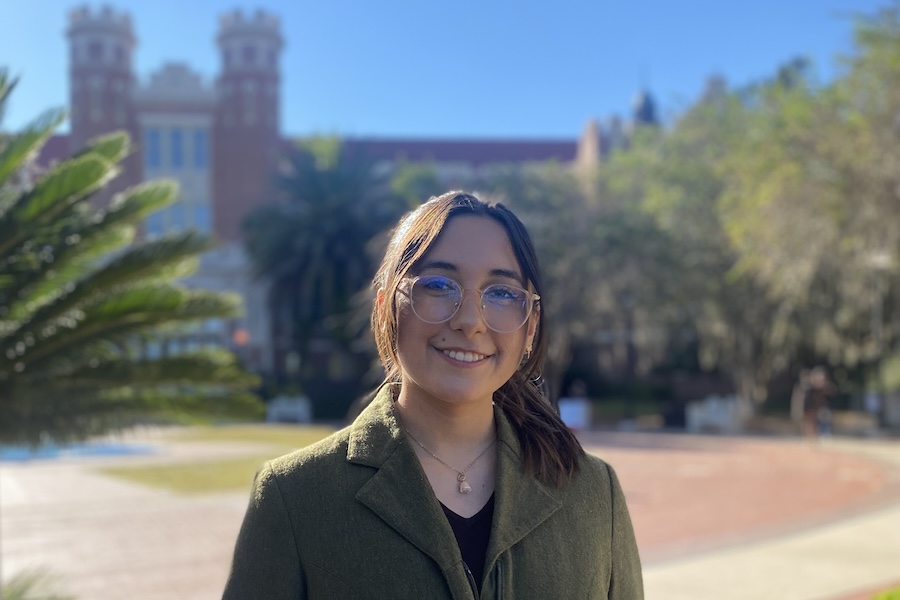Student Spotlight: Nadia Rassech

Nadia Rassech is a senior double majoring in Middle Eastern studies through Florida State University’s Department of Modern Languages and Linguistics and Middle East Center, both part of the College of Arts and Sciences, and international affairs through FSU’s College of Social Sciences and Public Policy. This year, Rassech won the Humanitarian of the Year Award from FSU's Center for Leadership and Service and the Global Citizen Award from FSU's Center for Global Engagement. Rassech was one of 30 prospective first-year students selected in 2021 by the Presidential Scholars Program, FSU’s premier undergraduate merit scholarship that invests in undergraduate students with extraordinary potential to be the transformational leaders of their generation. Rassech is currently in Fes, Morocco, spending her last year as an FSU student abroad to complete her Honors in the Major thesis on refugee law.
Tell us a little about your background, where you’re from and what brought you to FSU.
While I love my home state, California, I wanted to branch out. I applied to Florida universities because my family lived here when I was little, but I favored FSU specifically for its study-abroad opportunities. Being selected as a Presidential Scholar sealed the deal, especially since everyone in the program made me feel so welcome as an out-of-state student.
What inspired you to pursue a degree in international affairs and Middle Eastern studies?
My first semester at FSU, I took the Special Topics in International Affairs: Refugee Protection Issues class taught by Mark Schlakman, senior program director of FSU’s Center for the Advancement of Human Rights and teaching faculty in the College of Law. The class was one of my favorites and made me want to learn more about the Middle East. After taking more classes, including Arabic language courses, I became more connected with the MEC.
What aspect of your areas of study do you find most rewarding?
That first class set the tone for what I wanted to do in college and beyond. This led me to become a volunteer with Tallahassee’s chapter of the International Rescue Committee, which provides opportunities for refugees, asylum-seekers, victims of human trafficking, survivors of torture, and other immigrants to thrive in America. This work gave me much-needed perspectives as someone who aspires to study refugee law.
What does being a Presidential Scholar mean to you?
Before my cohort was announced, I was interviewed by a Presidential Scholar who shared my aspirations, which gave me someone to look up to right off the bat. It helped me gain confidence in putting myself out there and provided me with a supportive community.
What do you want the public to know about your research? Why are your topics important?
This summer I studied abroad in Muscat, Oman. The experience functioned as one case study in my thesis studying how refugees are perceived in various communities and what discursive and normative frameworks are used. I’m currently in Fes, Morocco, and this will be my second case study. My experiences in both Oman and Morocco will broaden the scope of what I’ve learned at FSU. My project decenters the United Nations to examine how refugeehood is perceived in countries that are and aren’t party to the U.N. Refugee Convention, the core U.N. document that established international refugee law.
What does earning FSU’s 2024 Humanitarian of the Year Award mean to you?
I’m honored to be a part of an incredible group who have such diverse inspirations and experiences. The most impactful part of my FSU experience has been the community. Universities are often seen as competitive spaces, but I’ve met so many here who will uplift you and advocate for you.
What on-campus resources have helped you achieve success?
The MEC is very welcoming, and the opportunities offered by my professors are how I’m so involved at FSU. I’m also grateful for my involvement with the Center for Global Engagement since freshman year. CGE’s International Coffee Hour allowed me to find parts of campus that celebrate and connect people from different backgrounds, which is important. Through CGE, I connected with people from all over the world who I might not have met otherwise.
What are some current goals or projects that you’re working on?
I’m currently studying at the Arabic Language Institute in Morocco and I’m excited for what that will hold. Over the summer, I studied at the Noor Majan Arabic Language Institute in Oman. I had Arabic class 8:30 a.m. to 3 p.m. every day, and other opportunities included visiting nearby towns with conversation partners and having traditional meals. My Oman experience was supported by the Ada Belle Winthrop-King Undergraduate Summer Semester Scholarship in Arabic, through FSU’s Department of Modern Languages and Linguistics, and the College of Social Sciences and Public Policy’s Social Science Scholarship.
Are there any faculty or staff who have helped or inspired you?
Professor Schlakman has taught many of my favorite classes and I'm thankful for all his guidance. I’m thankful for all the doors Zeina Schlenoff, MEC director and teaching faculty in the Department of Modern Languages and Linguistics, has opened for me. I’m also grateful for Tanya Perry, the assistant dean and director for COSSPP Academic Affairs, who motivated me and is the reason I’m in Morocco. Associate professor of history Will Hanley and professor of religion Adam Gaiser have been key mentors these past three years as well. They’ve both helped with my Honors in the Major thesis as they co-taught the class that inspired my topic, Islamic Law and Society.
Following your graduation, what are your plans? Even though you might miss FSU, what are you looking forward to once you graduate?
Studying abroad my senior year, I already miss FSU. Short term, I want to stay abroad for as long as possible to work on my Arabic immersion. I'm also applying for several study-abroad scholarships through the Office of National Fellowships. Long term, I want to go into international law with a concentration on refugee law.
